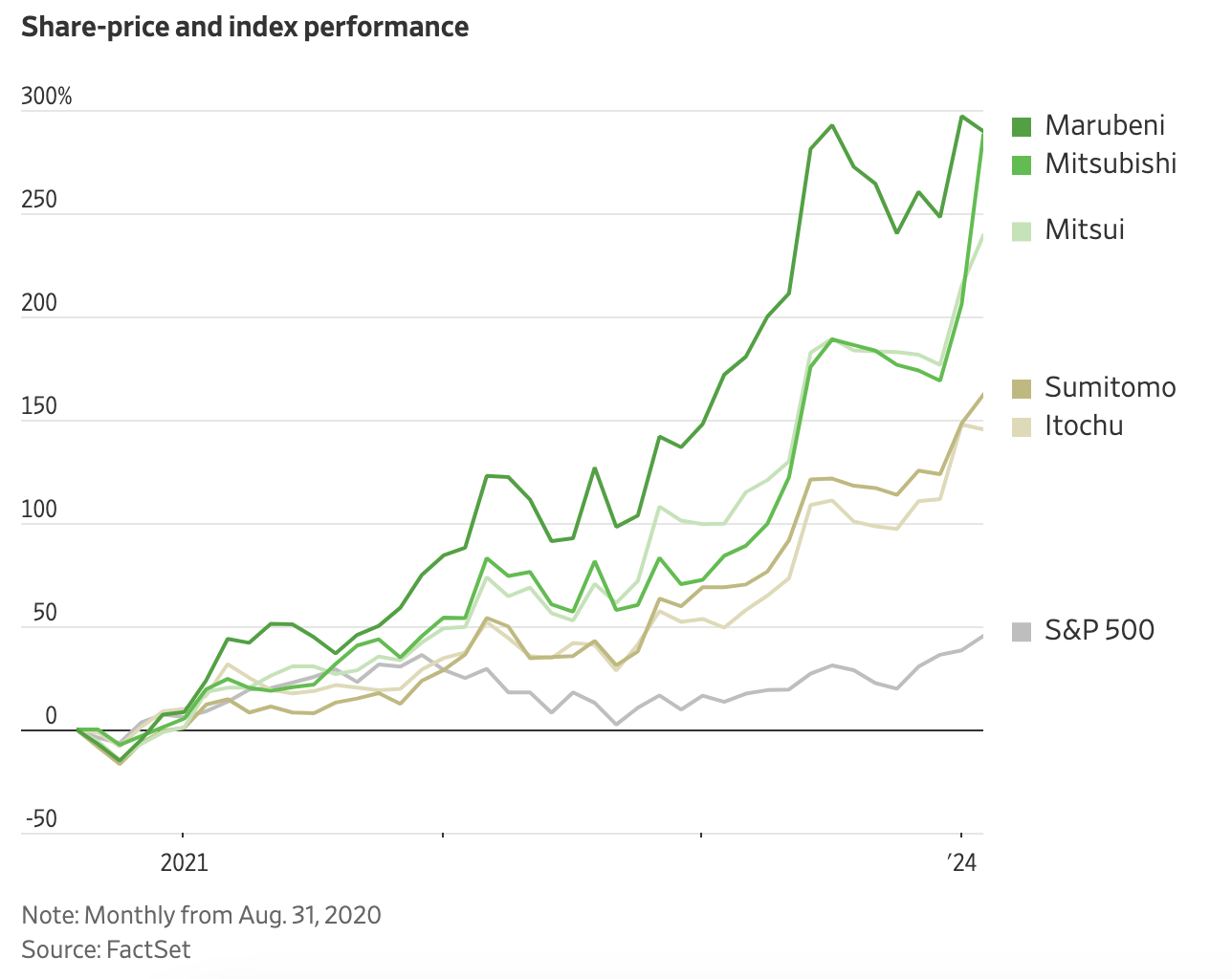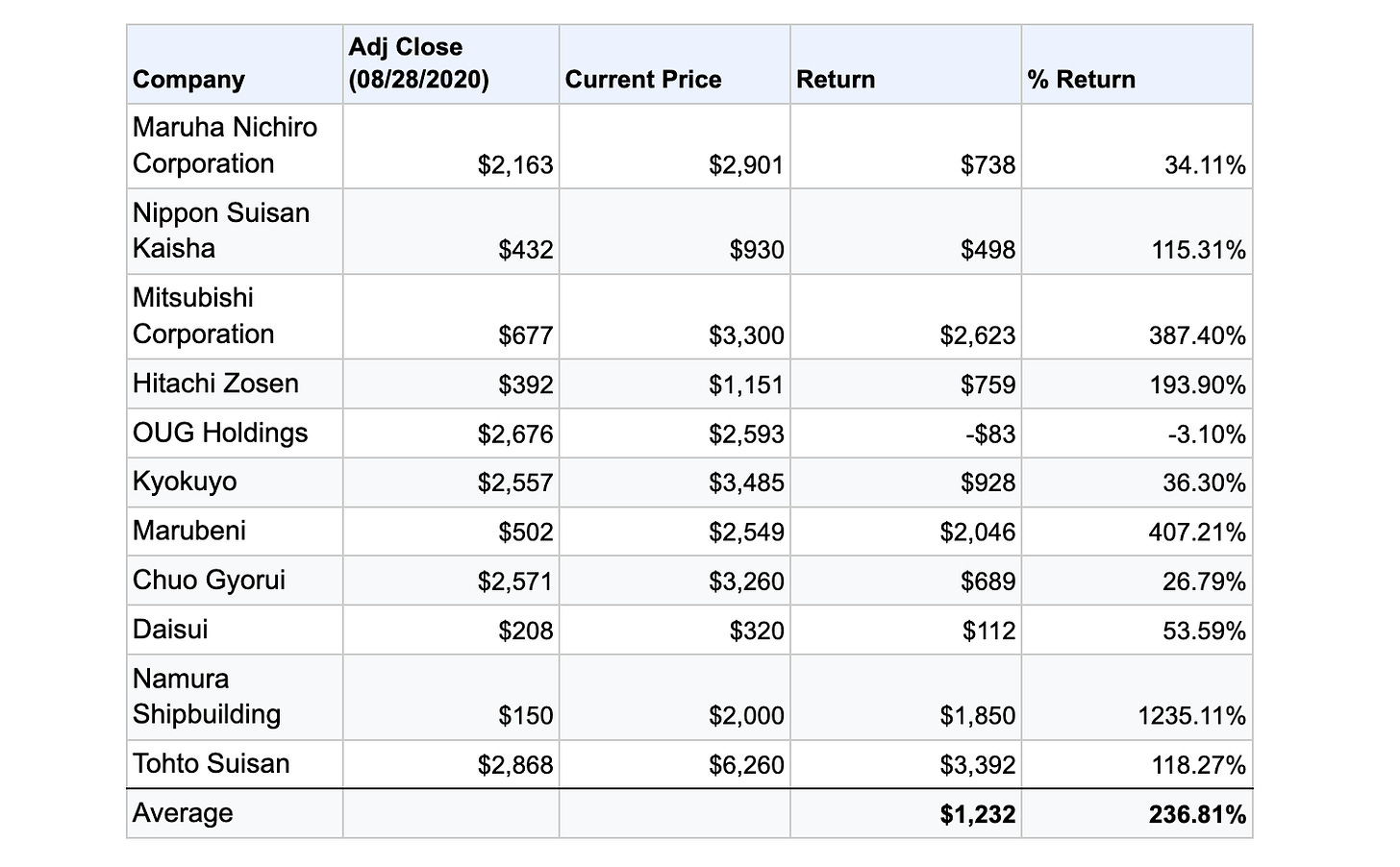Warren Buffett, Japan, and the Ocean 100
A portfolio of Japanese Ocean 100 stocks keeps pace with the Oracle of Omaha.

Disclaimer: This is not investment advice. I'm interested in the oceans and the markets and publishing on Substack. Anyone with an email can start one.
Last week, the Japanese stock market reached a new high. This event began grabbing headlines because the previous record was set in December 1989.
It's been a tough 30 years for Japanese investors.
The chart of the Nikkei stock index above tells the tale.
If you're old enough to remember the 80s, there was a time here in the US when you thought Japan was taking over. Oil prices had tripled from under $10 in 1979 to over $30 in 1982 in the wake of the Iranian revolution.
Fuel-efficient and notoriously reliable Japanese cars began taking over the market.
"In the span of two years, Big Three sales had plummeted 30%, to their lowest level since 1961. Chrysler was on the verge of bankruptcy, and over 100,000 auto factory workers had been laid off."
And with all of those juicy American profits, Japan went on a buying spree of trophy properties in the US, including high-profile buildings in New York.
"Japanese investment in the United States property market rose from $1.9 billion in 1986 to $7.5 billion in 1987 and $16.5 billion in 1988."
Kaizen, the Japanese business philosophy that directly translates as "continuous improvement," was all the rage.
Who can forget the classic movie Gung Ho that summed up the feeling of the times - depicting American auto workers struggling under the harsh eye of their Japanese overlords.
Japan was on a roll.
But as the chart above also shows, the meteoric rise would crumble quickly. The bubble burst.
From the 1990s through the early 2010s, Japan's economy stagnated under the pressure of failed monetary policies, an aging workforce, high savings (and low investment) rates, and cultural aversion to entrepreneurial risk.
In the meantime, the US market has been on a tear, especially post-2008 (the blue line is the SP500).
Slowly, Japan's market began to gain its footing.
However, the pundits and investors had been burned so many times by ineffective government interventions that you only heard a few cautious drumbeats about Japan's resurgence.
This made you wonder whether anyone got in on this somewhat under-the-radar rally in the world's third-largest economy.
Well, guess who did?
Warren Buffet.
Warren Buffett Hearts Japan
As an article in the WSJ, subtly titled “Warren Buffet was there for the Japanese market rally,” outlined,
"Berkshire Hathaway revealed in August 2020 that it had built stakes of about 5% in five Japanese trading companies. Berkshire has since added to its positions in Itochu, Marubeni, Mitsubishi, Mitsui and Sumitomo, themselves conglomerates with wide ranges of businesses and investments."
Berkshire's dip into Japanese stocks was also further highlighted in his annual letter to shareholders.
As the investor letter states, those positions have all grown to about 9%.
What does any of this have to do with oceans?
Japan is well represented in the Ocean 100 - the 100 largest companies that dominate the ocean economy (as compiled by Duke University research and cited many times here).
Duke University researchers found that dominant players in the ocean economy soak up a disproportionate share of the revenues in their industries and participate in segments that have significant barriers to entry.
It's no surprise that these are the kind of companies that Buffett and Munger would consider investing in.
This article highlights a deeper dive into the research:
Eleven publicly-listed Japanese corporations are in the non-oil and gas Ocean 100. Two of these companies - Mitsubishi and Marubeni - are members of the Buffett 5.
The chart below, taken from the WSJ article, shows that the members of the Ocean 100 were the top performers of Buffett’s select group.
All of this got me thinking…
If Marubeni and Mitsubishi were such great performers, how did the rest of Japanese Ocean 100 stocks hold up relative to Buffett's stock-picking wizardry?
Even without Buffett's superpowers, would a portfolio based on the research even come close?
Again, turning to the WSJ article, they pointed out the following performance:
"Since the market's close on Aug. 28, 2020, before Berkshire announced its investments, the S&P 500 has returned 53%, according to FactSet. The returns in yen of the five companies, by contrast, range from a low of 185% for Itochu to a high of 402% for Marubeni."
Using Aug. 28, 2020, as a common starting point (and Yahoo! Finance data), I estimate Berkshire's return on the five Japanese stocks to be about 277%. Again, solidly beating the S&P 500.
Comparing yourself to the Oracle of Omaha is always going to be rough, but as it turns out, the basket of stocks from the Ocean 100 held up amazingly.
Here's the breakdown.
Up 237%!
Not bad, my ocean-loving friends. Not bad.
Buffett's genius is picking great companies and investing at a fair price. This diligence helped him avoid the laggards in the group. But the larger basket certainly held up.
The fantastic performance of Namura Shipbuilding (up 1200%) saved the day for the Ocean 100 subset. Without that one stock, the performance drops to about 136%, lagging Buffet but still solidly outperforming the SP500.
A Compelling Case
Of course, the complete Ocean 100 Index is never going to keep pace with Buffett’s stock picking, but an index isn’t intended to. A portfolio of that size with large cap companies is naturally going to come to represent the broader market.
However, the Ocean 100’s performance versus the SP500 is compelling.
(More on the Ocean 100 Index here.)
It can lag, match or outperform depending on your time horizon, but this is without the benefit of oil and gas and tech companies that have been so impactful on the SP’s performance over the last few years.
At the end of the day, the idea that these money-grabbing companies present an interesting investment case seems to hold up to the Buffett test.
And that’s a pretty good place to start.









